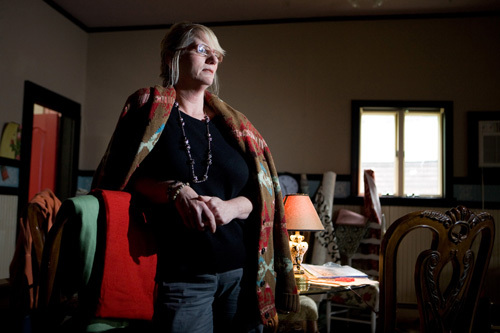
Twenty-two months of unemployment provides plenty of opportunities for discouragement to settle in, as Rosemarie Amato knows all too well. For close to two years, the former employment coordinator for the homeless fought through one of the toughest job markets in decades and wondered if she would ever find a full-time job again.
“After six months I felt like a hamster on one of those turn-wheels,” Amato, 51, said. “It began to feel really, truly desperate.”
Last year, after dozens of interviews, Amato finally landed a job at Future Attainment of Success Starts Today in Pawtucket. But data shows there are millions more people in the same desperate position as Amato was, and some of them are simply giving up.
The U.S. Department of Labor said that in April 1.2 million workers had given up hopes of finding a job, up by 457,000 from a year earlier. Nationally, 45.9 percent of the unemployed – or 6.7 million people – had been out of work for 27 weeks or more. In Rhode Island, 42 percent of the unemployed were out of work for 27 weeks or more; 22 percent have been out of work for at least a year, according to the R.I. Department of Labor and Training.
Many of the unemployed who have not lost hope show up at the door of Anne Marie Marge, director of career placement and cooperative education at the Community College of Rhode Island. In good times, many employed people went to CCRI to gain a competitive edge for a better job, Marge said. These days, workers – many of them older and shocked at being unemployed – are coming after months out of the labor force.
“It’s more out of necessity now rather than somebody who’s feeling they want to change for their personal satisfaction,” Marge said.
Amato was one of those people. She headed to CCRI for its associate’s degree program in paralegal studies in 2008 after months of fruitless job searching. Besides taking classes, she knocked on Marge’s door asking about unpaid internships.
She eventually did two internships, one with the Kent County division of the R.I. Adult Probation and Parole office and one at the R.I. Training School, the state’s prison for juveniles. The internships and her courses set the stage for her new job helping those sentenced to community service fulfill their requirements and integrate back into society. She is a few credits shy of finishing her associate’s degree, which would be her first higher education degree. With renewed confidence, Amato said she plans to soon leave her newfound job and start, along with a longtime friend, a home décor business.
Matthew Bodah, chairman of the economics department at the University of Rhode Island, said Amato likely made the right call in going to school. Studies have consistently shown that those with higher education earn more over their lifetimes than those that do not.
And older people like Amato out of work for weeks on end start from behind the eight ball in the job hunt said Bodah, who is also the research coordinator for the university’s Charles T. Schmidt Jr. Labor Research Center.
Technology and regulations can change during long spells of unemployment. People looking for work in rapidly changing markets, like fashion, also face the challenge of losing touch with emerging trends, Bodah said.
“All other things being equal I would say the person who has a longer spell of unemployment is going to have a tougher time” finding a job, Bodah said.
Jon Polis faces that situation daily. He is on track to hit his 99th week of unemployment on July 23, despite scouring online job boards and signing up for an online service that automatically submits his resume for positions that match his skills.
“It’s depressing but you can’t give up,” Polis said.
Polis wants the government to offer more opportunities for job training for people like him. The Community College of Rhode Island already hosts more than 90 degree and certificate programs and dozens more specialized, noncredit programs. About 70 of its programs also meet the guidelines of the Workforce Investment Act, a federal program that offers financial assistance to individuals seeking new skills to gain employment. In addition, the state offers tuition waivers for unemployed people with certain incomes.
Shirley Winslow used three tuition waivers while unemployed for 18 months after being laid off from her job as an administrative assistant at WSBE-TV, Rhode Island’s public broadcasting station. She enrolled in two computer classes at CCRI and a nonprofit management class at Rhode Island College. Those classes kept her skills sharp and helped her move into a new position as an administrative assistant at the R.I. Department of Labor and Training, she said.
This spring, 17,192 people enrolled in for-credit classes at the state’s only community college, a 17.8 percent increase over the spring 2006 semester, when 14,595 enrolled, CCRI said. College administrators say it’s not unusual for enrollment to increase when the economy dips. And Marge said that more and more students appear to come from the ranks of the long-term unemployed.
“They reach a point where they say ‘OK, I need to think about doing something differently,’ ” she said. •











